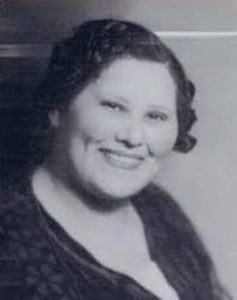
Flossie Bailey
*This date in 1895 is celebrated as the birth date of Flossie Bailey. She was a Black anti-lynching and civil rights activist.
Katherine Harvey (her birth name), the daughter of Mr. and Mrs. Charles Harvey, was born in Kokomo, Indiana, in 1895. Known as "Flossie," she grew up in Kokomo and attended Kokomo High School. She married Walter T. Bailey, a physician, in 1917. The couple resided in Marion, Indiana. While living in Marion, Bailey became actively involved in the community. She was a member of the city's Bethel African Methodist Episcopal Church congregation. She sought equality and justice as an American Civil Rights activist.
In 1918, Bailey established the Marion branch of the National Association for the Advancement of Colored People (NAACP). Initially, it did not receive much support. In June 1930, it had 96 members; however, after the Marion community Shipp and Smith lynching on August 7, 1930, the local chapter's membership increased to 155 members by the end of 1930. After that episode, she was actively involved in organizing a Hoosier delegation of NAACP members to speak to Indiana Governor Harry Leslie and persuade him to intervene in the investigation of the men's murders. She and several others worked hard to obtain a fair investigation into the double lynching. Two men were indicted and went on trial for the lynching, but neither one was found guilty of the deaths of Shipp and Smith.
In 1930, Bailey was elected President of the Indiana NAACP and helped plan its second annual meeting. Bailey worked to ensure nothing like the lynching in Marion would occur again. She lobbied the Indiana General Assembly to pass stricter anti-lynching laws. When opponents to the bill rejected many safety measures, Bailey organized a statewide effort, calling on chapters of the NAACP, Optimist Clubs, Exchange Clubs, and Democratic organizations to lobby state legislators. Bailey's efforts were successful, and the governor signed a stricter anti-lynching law in March 1931.
Once the Indiana bill became law, Bailey began lobbying for a national anti-lynching law and the fair treatment of Blacks in other sectors of American life. Bailey especially focused on fighting to end the segregation of schools, hospitals, and other public spaces such as movie theaters. Her home in Marion became the Indiana headquarters for the NAACP. The national organization recognized Bailey's efforts by awarding her the Madam C. J. Walker Medal for "the person who has done the best work in the NAACP during the year." Bailey and the NAACP struggled during the years of the Great Depression.
Her husband, who suffered a stroke, closed his medical practice in Marion around 1940, and the couple moved to Indianapolis. Doctor Bailey died on February 10, 1950. Their only surviving child was a son named Walter Charles Bailey. Flossie Bailey died in Indianapolis on February 6, 1952.